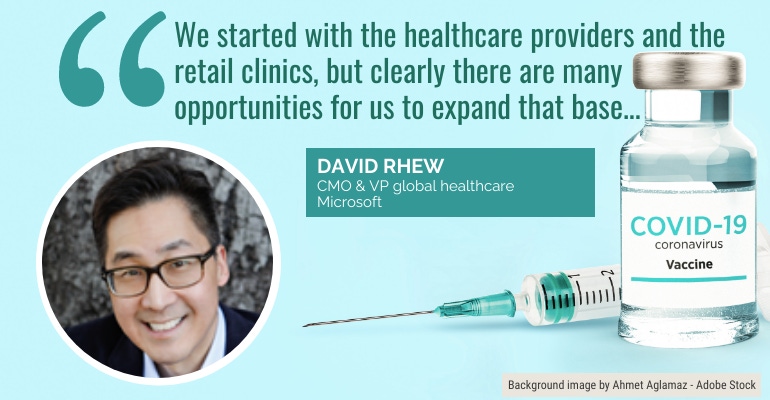Microsoft's chief medical officer talks about the software company's role in COVID-19 vaccinations and the current challenges he sees with this phase of the pandemic.
January 12, 2021

Contrary to what conspiracy theorists would have you believe, neither Bill Gates nor Microsoft has any plans of using COVID-19 vaccines to implant microchips in billions of people. That said, Microsoft is playing a role in COVID-19 vaccinations.
"Around the May timeframe, Microsoft partnered with FedEx around an opportunity to improve the supply chain logistics and cold chain management of the supplies, and this was done while in the midst of a pandemic," David Rhew, MD, chief medical officer and vice president of healthcare at Microsoft, said Tuesday at the Consumer Electronics Show (CES), which is being held virtually this year.
The goal of the partnership was really to address all of the challenges FedEx has been facing in order to help the shipping company optimize its workflows, Rhew explained.
That partnership led to the development of FedEx Surround, which allowed Microsoft to get real-time information on all the packages and all the COVID-19 vaccinations that could potentially be delivered, he said.
"Just in time for the vaccination rollout it was a little bit of serendipity there that we were able to get this all coordinated and organized in anticipation, but really done in advance of the vaccine rollout," Rhew said. "And what we have found is that working closely with FedEx as well as several other organizations, we've been able to get the vaccines distributed passively from the manufacturers through the facilities. Today there's been about 17 million of those vaccines that have been distributed."
Michelle Cortez, a senior reporter at Bloomberg News who moderated the discussion, asked Rhew if there had been any unexpected snags with the rollout, especially given that these vaccines need to be transported at such cold temperatures.
"Crossing our fingers, we haven't run into serious issues related to that," he said. "I do think that it will continue to be a challenge as we see more vaccines being brought onto the market and different types of requirements, but we are recognizing some of those early on and trying to address those."
Rhew said the more critical problem right now is that despite the fact that there has been about 17 million vaccines distributed, only 4.8 million have actually gone into the arms of individuals.
"So we're at that next phase where we need to start thinking about how we increase the vaccination rate, increase the number of people that are getting it, but also do it in a prioritized manner," he said.
So where is the challenge coming from there, and what is Microsoft doing in order to accelerate that process? Rhew said there's a couple different factors, one being the number of individuals and organizations that are able to provide the COVID-19 vaccinations.
"We started with the healthcare providers and the retail clinics, but clearly there are many opportunities for us to expand that base, and potentially even the arenas and venues in which they are delivered. That would have a dramatic impact in terms of our ability to be able to scale this," he said. "We're also seeing some opportunities to improve the experience, and so it's not just about getting a vaccine, but you know if we open this up, leveraging our existing systems, we will run into challenges such as long lines, crowded waiting rooms, people waiting and then running out of vaccine and being sent home, that's going to create a lot of frustration and anger on the part of not only the patients but the staff."
So for Microsoft, it's about understanding how to manage the flow of patients into these systems, which Rhew said will be incredibly important going forward.
"Some of the strategies that we've been looking at in terms of deploying is, let's get in front of this, let's try to understand who are the individuals that we can bring into the system through a pre-registration process, and then in the process of pre-registering them, allowing us to be able to allocate time slots that they can come in, sort of this block scheduling strategy, and then provide reminders for them — and then this is going to be particularly important as we think about that second dose because it's not just about getting one dose in, but it's about making sure that we now ensure that those individuals get that second dose, which is a timeframe of 21 to 28 days later," he said.
Is there a Microsoft tool to help manage distribution of COVID-19 vaccinations?
Rhew said Microsoft wanted to offer a solution for the unmet needs without getting in the way of the current systems.
"We also wanted to leverage what we learned in the pandemic in terms of what works and what doesn't work," he said, adding that what a lot of people really want right now is information about the virus and more individualized recommendations.
"They are searching all sources and looking to try to find those answers," Rhew said. "What we can do up front, and in the process of trying to address those questions, we can insert an artificial intelligence chatbot that has been used in many situations to provide those individual recommendations."
That same type of technology can be tied into a system that organizations use to pre-register patients for COVID-19 vaccinations.
"We have assembled a series of technologies that could either be implemented in sequence or in modular natures that can be integrated and based on existing infrastructure and workflows, would be meant to augment those systems, not necessarily replace them but really make things better, make them more integrated, and allow for a better experience," he said.
About the Author(s)
You May Also Like




